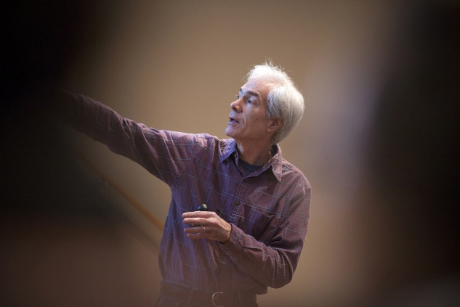Biochemistry professor focuses on undergrads
By Justin Pascoe

On the first day of his biochemistry class this semester, professor Gerald “Jerry” Feigenson invited 50 randomly selected students to meet with him and “figure out the grading policies of this class.” An educator and adviser devoted to crafting effective lectures, he also provides online all the information necessary to pass the course.
“I want to make it easy for people not to come to class,” said Feigenson, professor in the Department of Molecular Biology and Genetics, of his teaching style. “If [students] absolutely don’t have to go to class [because] every bit of information is provided … then I can see by attendance whether my lectures are worth anything or not.”
Feigenson continued: “If they show up, that means I’m providing something valuable to them. … After I’ve taught for a couple of weeks, students start to realize they want to hear what I have to say.”
In his lecture before each quiz, Feigenson tells students exactly what will and will not appear on the test. “If I focus on what students don’t know, it’s most of the universe. So I’m not interested in that,” he said. Rather than creating quizzes to discern what students do not comprehend from lectures, Feigenson uses quizzes to discover what his students have figured out.
The motivation behind Feigenson’s teaching approach stems from his undergraduate experience, where he felt he had only two “outstanding professors.” Armed with a clear example of what he wants to avoid, Feigenson has developed an engaging methodology to teaching a subject that continuously fascinates him. He believes it is his “privilege to teach such a deep subject and use that subject to educate students.”
Feigenson also maintains his excitement for teaching by translating the nervous energy of a lifelong anxiety disorder into animated classroom presentations. “The most scary thing for me in the entire universe is standing in front of a class and having everyone look at me,” he said. “As long as I don’t have an anxiety attack, that’s part of my energy.”
By harnessing his energy, Feigenson hopes to engage students in a way that alleviates their own anxiety toward education. He said: “Why should there be anxiety about what’s going to be on the quiz? There’s no need for that. … Anxiety is the enemy of learning.”
When his daughter began classes at Cornell in 1994, Feigenson realized “there’s so much information that [students] are just supposed to pick up.” So he began conducting weekly out-of-class sessions on topics that range from how to apply to medical school to “how to succeed at this place [Cornell],” and Feigenson devotes hours preparing for those sessions.
Above all, Feigenson finds motivation to continue providing such information to his students in the honor he feels in educating them. “I’m so damn lucky because I have this job,” he said. “I am in front of all these Cornell students – that’s a privilege.”
Justin Pascoe ’17 is a writer intern for the Cornell Chronicle.
Media Contact
Get Cornell news delivered right to your inbox.
Subscribe